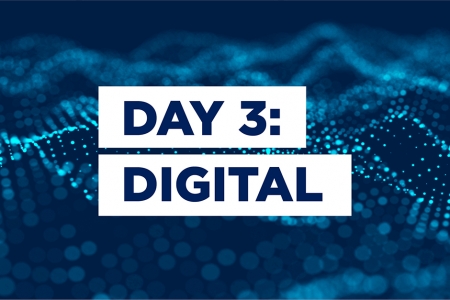You are here
Transatlantic Conference 2021 Day 3: the transatlantic digital economy
The third day of AmCham EU’s all-digital Transatlantic Conference 2021 took place on Friday, 26 March. Opening remarks from Susan Danger, CEO, AmCham EU and Zeger Vercouteren, Chair, AmCham EU (J&J) emphasised the speed with which digital technologies are transforming our economies and societies, a trend which has been further accelerated by the COVID-19 health pandemic.

Keep the data flowing
Bruno Gencarelli, Deputy Director in DG JUST at the European Commission was joined by Christopher Hoff, Deputy Assistant Secretary for Services, US Department of Commerce for a transatlantic discussion on the state of transatlantic data transfers moderated by Marta Cantero Gamito, Associate Professor of IT Law at the University of Tartu.
Both men expressed their commitment to negotiating a robust successor framework to the Privacy Shield mechanism, in line with the 2020 ruling of the Court of Justice to the EU in ‘Schrems II’. They agreed that data needs to move across borders; between sectors of the economy; and with public trust. They acknowledged the business need for legal certainty, alongside the twin public interest concerns of individual privacy and national security. A delicate balance must be struck, but both sides are committed to striking it together.
European Commissioner for Justice Didier Reynders then took the floor for a keynote address, in which he pointed to the joint commitment he and US Secretary of Commerce Gina Raimondo had made a day prior to accelerate efforts to develop a new Privacy Shield. He underscored that there is still more that binds the EU and the US together than divides us; and he called for common approaches to solve the challenges of our time. Read the full transcript of Commissioner Reynder's speech here.
Europe’s gate is open
Kim Jørgensen, Head of Cabinet, Executive Vice-President Vestager joined Martin Jetter, Chairman Europe, IBM and Kristine Braden, Managing Director Europe Cluster and CEO of Citi Group Markets Europe, Citi, for a fireside chat titled ‘keeping the gate open: shaping a transatlantic digital future’, moderated by Sasha Vakulina, Business Editor, Euronews.
Jørgensen explained that Europe’s ‘digital sovereignty’ ambition is about building open markets through rules-based trade relationships. Jetter expressed his belief that technological sovereignty can only be achieved by working with like-minded partners engaged in strategic partnerships. Braden identified data privacy, data security and the creation of a digital identity as key areas for cooperation in the digital finance sector.
Guided by common values
The final panel of the conference brought together Karan Bhatia, Head of Global Government Affairs and Public Policy, Google; Frances Burwell, Distinguished Fellow, Atlantic Council; Molly Montgomery, Deputy Assistant Secretary, Bureau of European and Eurasian Affairs, US Department of Stat; and Miapetra Kumpula Natri MEP (S&D, FI) for a discussion on the international digital agenda moderated by Paul Hofheinz, President Co-Founder, The Lisbon Council.
The speakers agreed that cooperation is crucial as digital technologies underpin the transatlantic economy, and will continue to rapidly develop. Artificial intelligence, data flows, data privacy and digital taxation were identified as areas where dialogue is needed to move ahead quickly.
Speakers also discussed the method by which to ensure fruitful transatlantic dialogues. There was support for establishing an institutional dialogue. The panellists underscored that conversations should take place before policies are implemented so as to avoid divergence between the US and the EU. Finally, the panellists agreed that values should guide transatlantic efforts to cooperate. Both sides support democracy, freedom of speech and data protection and this brings us closer together.
Together for a better future
Susan Danger closed the day and the conference by reiterating the importance of the transatlantic relationship to the global economy. It is up to the EU and the US lead the world into the future that we want to see: one of free trade and multilateralism; one of sustainability and prosperity; and one of digital connectivity.
